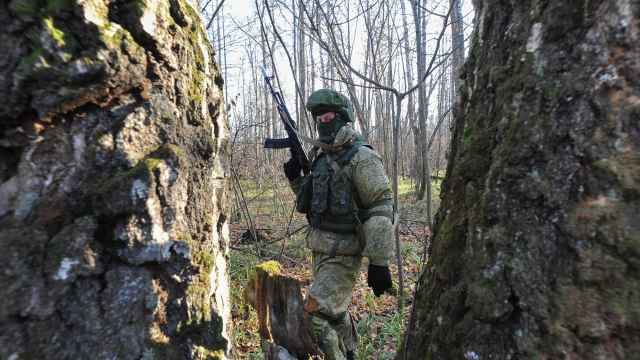Russian authorities have banned public discussions of a wide range of non-classified military subjects that activists say will effectively prevent the public from learning crucial information about the Armed Forces.
The 60-point Federal Security Service (FSB) order, which enters into force Dec. 1, lists information that is not classified as a state secret, but which “can be used by foreign states, organizations and citizens against Russia’s security.”
Among the subjects banned from discussion are the structure and size of the Russian Armed Forces.
Other off-limits areas include weapons, troop deployments and training, as well as troop morale and crimes committed by members of the Armed Forces.
Mobilization and civil defense topics are also barred from being openly discussed, as are assessments and forecasts of Russia’s military and strategic situation.
The FSB list mirrors last year’s ban on sharing non-classified information in Russia’s defense and space industries.
It was revised last month to include information about the transportation of military personnel and ongoing military construction.
“The purpose of the updated law with the FSB list is to make sure we don’t see anything,” Sergei Krivenko, the head of the Moscow-based NGO Citizen, Army & the Law, said Wednesday.
Those who share the information publicly risk being labeled “foreign agents,” a Soviet-era designation with draconian rules and restrictions.
“This doesn’t only refer to foreign agents, but also ordinary citizens who may be recognized as distributors of information detrimental to Russia,” Krivenko told Sever.Realii, a regional affiliate of the U.S.-funded Radio Free Europe/Radio Liberty (RFE/RL) news organization.
Prominent human rights lawyer Pavel Chikov sought to dispel “unwarranted alarmism” about the list, suggesting the FSB is unlikely to start slapping the “foreign agent” label indiscriminately on anyone who discusses Russia’s war in Ukraine.
“To date, not a single case of the [FSB’s] list being applied is known,” Chikov wrote on social media Thursday. “This of course doesn’t mean that this will continue.”
Also entering into force Thursday is Russia’s expanded “foreign agent” law that will give Russian authorities extra leeway to declare citizens and organizations “foreign agents.”
“To be branded a foreign agent nowadays, you don’t even need foreign funding, foreign influence is enough,” said Alexander Peredruk, who has represented several “foreign agents” in court.
Some lawyers believe that the 60-point list only applies to members of Russia’s security services and does not limit public discussions of sensitive but unclassified matters, according to Sever.Realii.
A Message from The Moscow Times:
Dear readers,
We are facing unprecedented challenges. Russia's Prosecutor General's Office has designated The Moscow Times as an "undesirable" organization, criminalizing our work and putting our staff at risk of prosecution. This follows our earlier unjust labeling as a "foreign agent."
These actions are direct attempts to silence independent journalism in Russia. The authorities claim our work "discredits the decisions of the Russian leadership." We see things differently: we strive to provide accurate, unbiased reporting on Russia.
We, the journalists of The Moscow Times, refuse to be silenced. But to continue our work, we need your help.
Your support, no matter how small, makes a world of difference. If you can, please support us monthly starting from just $2. It's quick to set up, and every contribution makes a significant impact.
By supporting The Moscow Times, you're defending open, independent journalism in the face of repression. Thank you for standing with us.
Remind me later.






